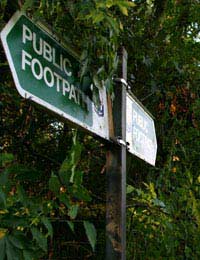English Countryside Etiquette

The English countryside has plenty to offer keen walkers and holidaymakers. It is sprawling with rolling green hills, rugged mountains, picturesque landscapes and dramatic chalk cliffs. With secluded woodlands and a far-stretching scenic coastline the English countryside has it all. In order to preserve it however, all explorers must be aware of, and follow, countryside etiquette.
The Countryside Code
To encourage walkers to act responsibly, whilst out enjoying the English countryside, there is a recommended guide to follow. These guidelines ensure that walkers stay safe and include the following principles:- Plan ahead
- Follow countryside signs
- Consider other people
- Keep your dog under control at all times
- Protect nature by taking your litter home with you for disposal
- Leave gates, and other property, as you find them
Rights Of Way
There are around 140,000 miles of off-road routes to explore throughout England and Wales. These are known as Rights of Way. Maintenance and protection of these pathways and areas is the responsibility of the local authorities. These routes are easily accessible if you follow an Ordnance Survey Explorer or countryside map.The Rights of Way, by law, cannot be diverted or closed and must remain unobstructed at all times. If a walker encounters a path that is blocked by overgrowth, barbed wire or general poor upkeep of a gate or stile, they are entitled to find an alternative route, if they are not able to remove the obstruction. The walker should then report the obstruction to the Rambler’s Association - their aim is to keep the countryside accessible to all and they will take this up for you.
Gateways
Respecting the countryside means leaving it in the same condition, or better, than you find it. This means respecting a landowner or farmer’s rules, regarding the opening and closing of gates. A gate may be closed to control livestock, or open to allow the animals access to food and water. It is therefore important to pay attention to how you find gates and to ensure they are left in the same way they are found.Walking The Dog
Many ramblers like to take dogs on their countryside exploration and dog walking is a popular pastime along the English country paths. Keeping dogs under close control is obligatory at all times. When walking near to livestock and farm animals dogs must also be kept on a short lead. In some areas – like land where lambing takes place – dogs may be banned. Allowing your dog to foul a public area is considered an offence, so you must also clean up after your pet and dispose of the mess in an appropriate manner.Always check signs before setting off for a country walk with your dog. Information regarding walking restrictions is available from the Countryside Agency, which provides details about safe walking with your dog.
Litter Matters
The protection of animals, birds, trees and plants is a walker’s responsibility. Littering and leaving leftover food is not only damaging to the beauty of the English countryside but also poses a potential hazard to wildlife and farm animals. All walkers must therefore ensure they take all litter home with them.- Train Travel Etiquette
- How to Avoid Causing Offence When Travelling
- Etiquette When Travelling With Young Children
- Business Travel Etiquette
- Group Travel Etiquette
- Plane and Air Travel Etiquette
- Airport Etiquette
- Etiquette Tips for Staying in Hotels
- How to Blend in With the Locals
- Etiquette Tips When Travelling Solo
- Etiquette Tips When Travelling With Pets
- Spa Etiquette Tips


Re: Etiquette in China
I’ve seen this blog cited for all these mainstream articles about table etiquette in China—but where’s the reference/source for this one? I…
Re: How to Behave in California
I’m a born and raised Californian, if you want to blend in, in most parts of California people say hella a lot. “Dude this sh*ts…
Re: Etiquette in Tunisia
I am tunisian and i want to tell you that your fiancé lied at you. There is nothing in tunisian customs called bringing gifts to all family…
Re: Etiquette in Greece
Greeks honored their dead bye first coating their bodies in oil and then put them in a tall bed so that mourners May morning then they put…
Re: Etiquette in Tunisia
This is an answer for Topaz about gift. no its not mandatory, you can come and bring nothing. its just rude impolite and greedy from them to…
Re: Etiquette in Scandinavia
I enjoyed your article. You may have saved me from future embarrassment. It is funny. Some of the traits you mentioned as Scandinavian…
Re: Good Manners in Bulgaria
This was really nice to know,I really liked the second helping thing and also the kiss on the cheek.
Re: Etiquette in Greece
On a recent trip, after the owner of the hotel gave me a lift, he kissed me on both cheeks after I tipped him. I was a bit taken back. What…
Re: Etiquette in Scandinavia
This helps me so much with my International Day project.
Re: Etiquette in Kenya
While I'm not asking this question based on travel experiences, rather it is based on some photos of a woman form Nairobi, Kenya. She has…